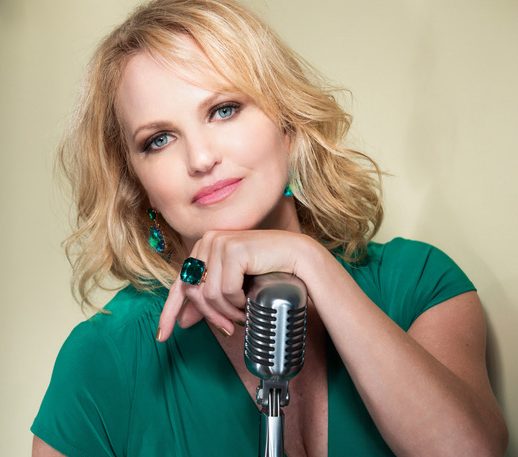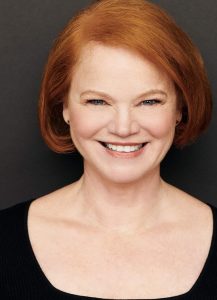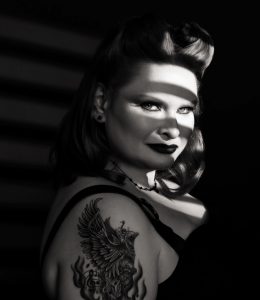Bistro Bits: From Gershwin to Booze, Broadway, Murder, and Sex, Cabaret Shows Take on a Variety of Themes
We’ve now reached the point in the year when the influx of new cabaret runs may be tapering off a little, giving way to year-end holiday offerings (often one-offs), with songs about wise men, snowmen, and the occasional dreidel. Also, bistroawards.com has been on a short hiatus that began Thanksgiving week. So, in this column, I’m featuring what might be called “Backlog Bits”—comments on some shows I saw from late November into very-early December.
Juliet Ewing’s Knack for Gershwin Tunes
This recent encore of Juliet Ewing’s George Gershwin tribute show, Rise Up Singing (Don’t Tell Mama; directed by Lina Koutrakos) was like a panoply of delicious confections in a bakery’s front window. Except you didn’t have to pick just one. You could consume all of Ewing’s songs in the course of an hour and leave with zero indigestion.
Ewing comes to cabaret from the theatre. She performed Gershwin songs nightly during her stint with the European tour of Crazy for You (the 1992 musical-comedy jukebox show). She clearly has a knack for singing this composer’s songs (which, in this show, were almost exclusively ones that George wrote with brother Ira). She proved to have just the right mix of innocent mischief, common sense, and elegance.
She opened with “Things Are Looking Up”: soft but bright. Her bit of scatting here had an appealingly lilting flute-like quality. In the course of the evening, she gave us a “How Long Has This Been Going On?” in which she seemed nearly locked in an ecstatic trance; a snappy “A Foggy Day (In London Town)”; and a pristine, almost prayerful “Someone to Watch Over Me.” She found the right voice for every song. When she needed to belt, she belted.
Starting out the show, Ewing explained that, because there have been so many Gershwin tributes over the years, she would skip the usual biographical facts and figures and let the songs speak for themselves. As a patter alternative, she talked a bit about her own life and career. The best of this chat centered on her time with Crazy for You. After singing a number that she performed regularly in the show–“Naughty Baby”–she brought to the stage her former co-star from the musical, Patrick Boyd, who joined her in some playful duetting.
The show’s 11 o’clock number was the one song on Ewing’s setlist for which Ira Gershwin was not credited as lyricist: “Summertime” from Porgy and Bess, with a lyric by DuBose Heyward. The whole arrangement and presentation of the song had a different sensibility from the rest of the show, but this was not a bad thing. The number was both “spiritual” and like “a spiritual.” The racial aspect of the Porgy story was alluded to, with an emphasis on (and repetition of) the phrase “rise up singing” (which also, of course, is the title of Ewing’s show). Her performance of the number was mesmerizing (in a way that made me think somehow of Aimee Semple McPherson).
Pianist Ron Drotus also served as Ewing’s musical director. Drummer was Daniel Glass. And Michael O’Brien played bass—most notably (and indispensably)—when he duetted with Ewing on “Slap That Bass.”
Presented at Don’t Tell Mama, 343 W. 46th St., NYC, Nov. 17, 2024.
Melodie Wolford on Life as an Understudy
All Melodie Wolford wanted as a child was to be an actress. Hers was a dream that’s immensely familiar to those who follow cabaret. After all, any number of budding club performers have built acts around stories of their theatrical-career fantasies, humble beginnings in the business, and reminiscences about how they made good, fell short, or landed somewhere in the middle (if they landed at all). Wolford’s cabaret-debut act was a little different, however, in that while she did find success in musical theatre, it was primarily as an understudy. She revisited her experiences in her recent show, Waiting in the Wings (directed by Richard Sabellico) at the Triad Theater.
All told, Wolford has tallied 24 understudy assignments during her career, including stints supporting Karen Ziemba and KT Sullivan. She has also landed musical-theatre roles in various other productions around the country, including some in which she found the roles reversed, with eager performers working as understudies to her.
She’s a comedic performer with a sturdy voice and an energetic personality. Her patter streamed out, full of amusing detail. She told of losing out on a role to Kristin Chenoweth and of making friends along her way with such important theatre-makers as Susan Stroman and the late (and notoriously not-so-charming) Arthur Laurents, who somehow got along with her. Wolford can “put over” a song easily. Among the best numbers in her act were “Smile” (Charlie Chaplin, John Turner, Geoffrey Parsons) and “Fifty Percent”(Billy Goldenberg, Marilyn and Alan Bergman).
This was a debut to be proud of. My principal bit of advice to her for her next club outing would be to remember that cabaret performance at its best is not so much about putting on a show as it is about communicating with the audience. (In this regard, Wolford may have been at some disadvantage here because the Triad’s proscenium stage configuration seems to shout “It’s show time!”) It would also serve her well to slow things down at times, giving some air to her more reflective moments.
Wolford was very capably supported by musical director/pianist Bill Zeffiro along with bassist Alden Terry and drummer Adam Wolfe. Zeffiro joined her in vocal duet on a “Mack the Knife” revamp, with special lyrics by her son, Alexander Craven, who also wrote the music and lyric for another song in the show.
Presented at the Triad Theater, 158 W. 72nd St., NYC, Nov. 23, 2024.
Becca Kidwell on Murder and Sex
In a return to Don’t Tell Mama of the often-startling If You Hadn’t …But You Did (directed by Jeff Harnar), Becca Kidwell mined our collective fascination with murder most foul. Kidwell—who admitted early on that she has watched far too many “true crime” TV reality shows—often treated the material here with a wink. In the show’s title song (by Jule Styne and Comden & Green) and in Rodgers & Hart’s “To Keep Our Love Alive,” she employed the sort of jolly dark humor one finds in Arsenic and Old Lace’s sweet little-old-lady poisoners or Chicago’s merry murderesses defending their done-him-ins in “Cell Block Tango.”
But sometimes her “just kidding” attitude was barely perceptible. Sometimes Kidwell kidded so well that I watched her and felt a little unsettled.
I found this especially true in her opening number, Sonny Bono’s “Bang Bang (My Baby Shot Me Down),” where she sang not from the murderer’s point of view but from the murdered’s. She inhabited the song’s protagonist so believably, in such timid, needy tones, that I felt I’d entered a realm of real darkness. Again: unsettling! But also gripping.
Kidwell’s next turn was less bleak: a stylized stripper-like bit, performed as she sang a slow version of Cole Porter’s “Let’s Do It, Let’s Fall in Love.” Here, she twirled and pointed her two be-gloved hands as if they were a pair of dark pistols, sexily doffed her scarf, and swatted at one of the nasty mosquitoes who “do it” with a little black paddle that looked like it had fallen out of somebody’s BDSM gear box. (Kidwell, in this and in a couple of other numbers, seemed to have benefited greatly from her work with choreographer Ann Cooley.)
But the inclusion of songs exploring bondage, discipline, sadism and masochism tended to muddle the already dark water a bit, I think. Murder, however cartoonish it may be portrayed, is murder. Kinky sex play and murder are not the same thing. To suggest that they are is sort of like comparing apples and deadly nightshade. For one thing, you have a “safe word” in BDSM play—not so in homicide. (Kidwell, by the way, revealed her hilarious safe word early in the show, and it got a nice payoff later.)
In any case, the show was engaging throughout. Kidwell and Harnar varied the approaches in each song enough to hold the audience’s attention. Kidwell also received some wonderful help from musical director and pianist Jon Weber, who – as ever– played with sensitivity and wit.
Maybe because she was, to one degree or another, playing characters in this show’s songs, Kidwell didn’t often give us glimpses of all she’s capable of as a vocalist. But during an effective pairing of “Once Upon a Dream” (Sammy Fain and Jack Lawrence, following a Tchaikovsky theme) with “Warm All Over (Frank Loesser), we heard her sing “straight,” and it was a pretty sound—one I look forward to hearing more of in future shows.
Presented at Don’t Tell Mama, 343 W. 46th St., NYC, Nov. 29, 2024.
Robert Driemeyer Invites You for a Cocktail
Broadway Barfly at The Green Room 42, was an encore performance of a show that Robert Driemeyer launched at 54 Below in 2023. It had grown out of a series of videos on his YouTube channel, which focuses on the two causes for which Driemeyer most ardently advocates: Broadway (especially musical Broadway) and cocktails.
This edition of the show was also a tempting invitation for some socially acceptable day drinking, as it happened at 1pm on a Sunday and there was an option to purchase a flight of some of the many alcohol-bolstered offerings that figured in the show’s narrative. The lineup in this flight started with the familiar Manhattan (not to be confused with the “Jerry Thomas Manhattan”) and soon segued to more exotic offerings, including a recently revived oldie called the “Cabaret” cocktail, which features among its ingredients some splashes of latter-day absinthe. I didn’t partake in this booze fest, and neither did Driemeyer, though he certainly made his creations seem appetizing. (Inclusion of nicely produced and projected videos showing the mixing of the various cocktail creations was a welcome touch.)
Driemeyer assumed a jaunty, old-school attitude (with a few dashes of seasoned and salty barfly wisdom) and revealed a crisp, assured singing voice, suited well for such songs as Rodgers & Hart’s “Manhattan” and Cole Porter’s “Say It with Gin.” He’s also a talented raconteur, who moves from anecdote to anecdote (and song to song) with smooth efficiency. But he’s not all about the quick gags and pithy remarks. I found his dramatic take on Weill and Brecht’s “Bilbao Song” to be both impressive and genuinely moving. He was well-served by his pianist and music director Brad Vieth, who not only co-wrote two songs in the show (with Michael Conley) but also provided some amusing sound effects to punctuate the host’s gamboling patter.
Special guest performer, Broadway’s Christine Dwyer sounded fine on her two numbers later in the show (a song from Waitress and another from Wicked). But these songs were not in the same merry mood as the rest of the itinerary, and the spell Driemeyer had created may have become slightly cracked near show’s end. Fortunately, our friendly singer/mixologist quickly got things back on track before last call. ¡Salud!
Presented at The Green Room 42, 570 10th Ave., NYC, Dec. 1, 2024.
###
About the Author
Mark Dundas Wood is an arts/entertainment journalist and dramaturg. He began writing reviews for BistroAwards.com in 2011. More recently he has contributed "Cabaret Setlist" articles about cabaret repertoire. Other reviews and articles have appeared in theaterscene.net and clydefitchreport.com, as well as in American Theatre and Back Stage. As a dramaturg, he has worked with New Professional Theatre and the New York Musical Theatre Festival. He is currently literary manager for Broad Horizons Theatre Company.








